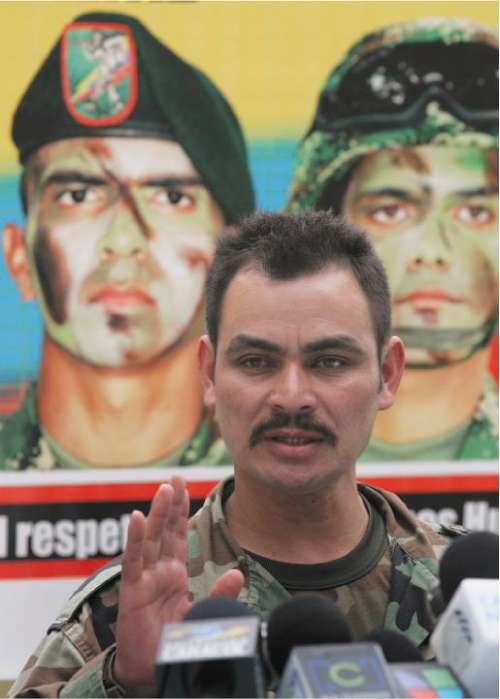Ex-rebel could get $2.5m from Colombia for killing his boss

The Colombian government is considering whether to pay a $2.5m bounty to a left-wing guerrilla who murdered his commander and delivered his victim's severed hand to officials at a military base.
The killing of Ivan Rios – the second leading figure from the Revolutionary Armed Forces of Colombia (Farc) assassinated this month – is being presented as evidence that the government is winning its decades-long battle against the rebel group. But the prospect of paying $2.5m (£1.2m) to Pedro Pablo Montoya, a confirmed Farc member with a long and bloody history as a rebel fighter, has stirred controversy in the capital, Bogota.
The government is examining evidence provided by Montoya, also known as Rojas, who claims he shot Rios dead with a single bullet to the head before killing the leader's girlfriend and delivering his severed hand to the army, along with a laptop computer. The Farc has lost much of its public support and offering cash rewards for information leading to the capture or killing of rebels has proved an effective tactic, but there is resistance to the idea of rewarding a man that many would regard as a murderer.
The slaying of Rios – less than a week after the senior Farc commander Raul Reyes was killed in an air strike on his jungle camp in neighbouring Ecuador – has shattered the invulnerable reputation of Latin America's longest-running insurgency. Previously, the Colombian military had failed to capture or kill a single member of the Farc's seven-man ruling secretariat. Rojas said he killed his boss to break an army siege before more people were killed, adding: "I did it to save my life and that of my girlfriend and another companion."
The country's right-wing President, Alvaro Uribe, who sparked an international crisis by ordering the cross-border attack on Reyes, said: "We must wait to see what the judicial authorities say... for them to determine what state the Farc group led by Ivan Rios was in... to weigh risk against action taken by the person who is claiming the reward."
The US-backed government says the rebels are narco-terrorists who run the country's cocaine trade, while Farc leaders claim they are a Marxist-Leninist group aiming to redistribute the nation's wealth, and that their struggle predates the drug boom.
Attempts have been made in the past to reach a negotiated settlement but the present administration led by Mr Uribe – whose father was killed by the rebels – has pursued a military solution with the help of billions of dollars in US aid. The government insists that effort is now working, saying the Farc force has been reduced from a peak of nearly 17,000 fighters to nearer 10,000.
"They have less support of the population, less money, less discipline and do not have the same ability to carry out attacks," said Alfredo Rangel, a leading Farc expert. "The guerrillas are in decline." But he and others caution that the rebels remain a potent force who will not be eradicated in the near future.
The military pursuit of the Farc in remote parts of Colombia is hitting vulnerable indigenous communities. The army has been accused of bombing the Nukak people – Amazonian nomads who contacted the outside world for the first time only 10 years ago. Stephen Corry, of the Survival International tribal support group, said: "It is appalling that the Nukak, one of the few surviving nomadic tribes in the Amazon, are being engulfed by fighting which is nothing to do with them. Literally hundreds have died in the past 20 years – partly from disease, and partly from being caught in the violent warfare."
Join our commenting forum
Join thought-provoking conversations, follow other Independent readers and see their replies
Comments
Bookmark popover
Removed from bookmarks